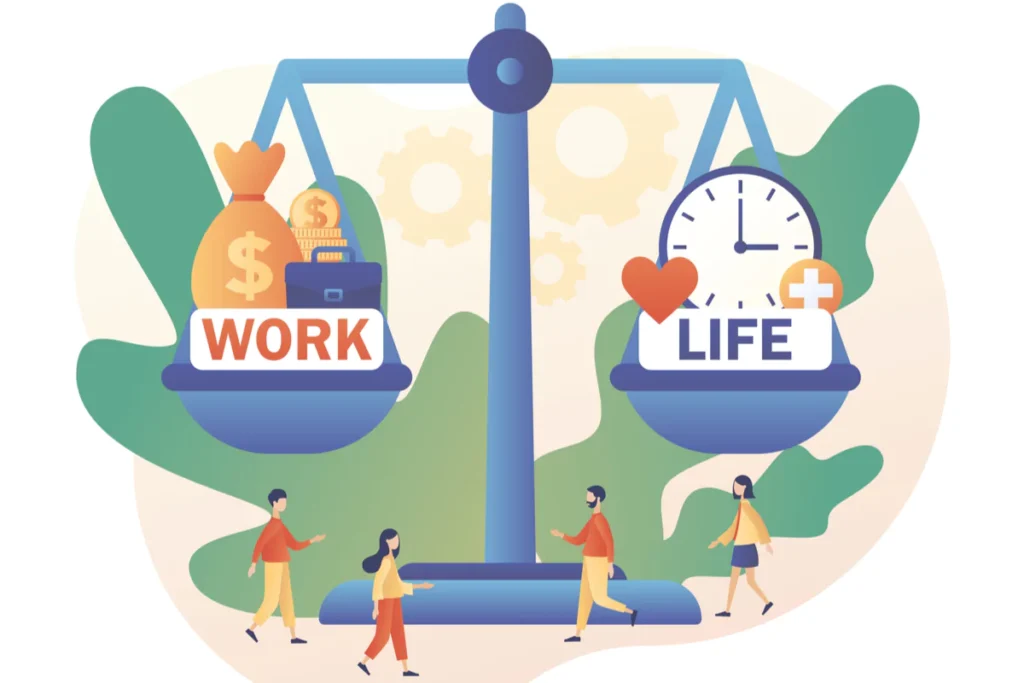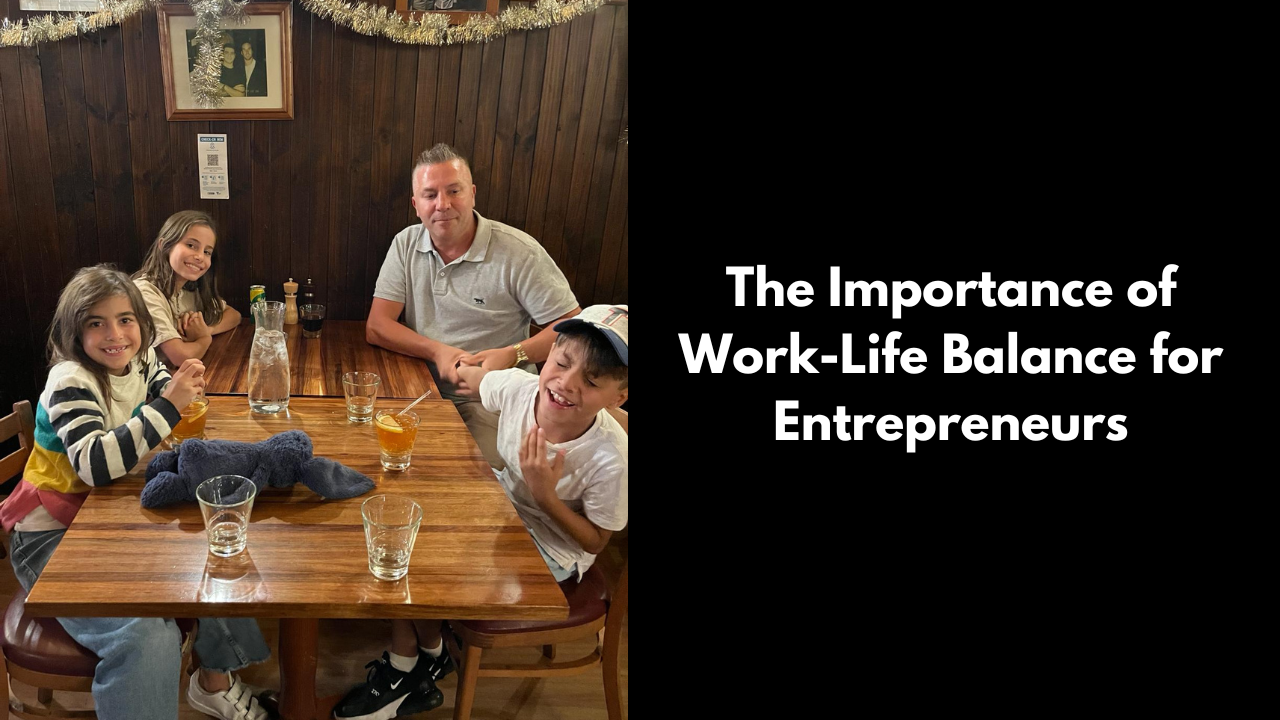In the fast-paced world of entrepreneurship, maintaining a healthy work-life balance can often seem like an elusive goal. Entrepreneurs are driven by their passion, dedication, and ambition, which can sometimes lead to an all-consuming focus on their business ventures. However, neglecting personal well-being and relationships in pursuit of success can have detrimental effects in the long run. David Deicke, a successful Australian businessman and former boxer, understands the critical importance of work-life balance. In this blog, we will explore why work-life balance is essential for entrepreneurs and how to achieve it effectively.
Understanding Work-Life Balance

1. Defining Work-Life Balance: Work-life balance refers to the equilibrium between professional responsibilities and personal life. It involves allocating time and energy to work, family, hobbies, and self-care in a way that promotes overall well-being and satisfaction. For entrepreneurs, achieving this balance is crucial to sustain long-term success and happiness.
2. The Challenges for Entrepreneurs: Entrepreneurs often face unique challenges in maintaining work-life balance. The demands of starting and running a business can be overwhelming, leading to long hours, high stress, and limited personal time. David Deicke emphasizes the need for entrepreneurs to recognize these challenges and actively work towards balancing their professional and personal lives.
The Benefits of Work-Life Balance
1. Improved Mental Health: Maintaining a healthy work-life balance is essential for mental well-being. Chronic stress and burnout can negatively impact mental health, leading to anxiety, depression, and decreased productivity. By prioritizing personal time and self-care, entrepreneurs can reduce stress levels and improve their overall mental health. David attributes his mental resilience to his commitment to work-life balance.
2. Enhanced Productivity: Contrary to the belief that working longer hours leads to greater productivity, taking breaks and balancing work with personal time can actually enhance productivity. Rest and relaxation rejuvenate the mind, leading to increased focus, creativity, and efficiency. David’s approach to balancing work and leisure has significantly contributed to his business success.
3. Strengthened Relationships: Work-life balance allows entrepreneurs to nurture their relationships with family and friends. Strong personal relationships provide emotional support, reduce stress, and enhance overall happiness. David values the time spent with his family and friends, recognizing their crucial role in his life and success.
4. Better Physical Health: Long hours and neglecting personal well-being can take a toll on physical health. Entrepreneurs who prioritize work-life balance are more likely to engage in regular exercise, maintain a healthy diet, and get sufficient sleep. David’s commitment to physical fitness, a habit from his boxing days, plays a vital role in his overall well-being.
5. Increased Creativity and Innovation: Taking time off from work allows the mind to rest and recharge, fostering creativity and innovation. Entrepreneurs who maintain work-life balance are more likely to come up with fresh ideas and innovative solutions. David believes that his best ideas often come to him during moments of relaxation and leisure.
Strategies for Achieving Work-Life Balance
1. Setting Boundaries: Establish clear boundaries between work and personal life. Designate specific times for work and stick to them. Avoid bringing work-related tasks into personal time and vice versa. David emphasizes the importance of setting boundaries to protect personal time and maintain a healthy balance.
2. Prioritizing Tasks: Identify and prioritize tasks based on their importance and urgency. Focus on high-priority tasks and delegate or postpone less critical ones. Effective time management helps entrepreneurs accomplish more in less time, allowing for personal activities and relaxation. David’s disciplined approach to task management ensures he stays productive while maintaining balance.
3. Scheduling Personal Time: Incorporate personal time into your daily schedule just as you would schedule work-related tasks. Allocate time for hobbies, exercise, family activities, and relaxation. Treat personal time as non-negotiable to ensure it is not overshadowed by work commitments. David schedules regular family outings and personal activities to maintain balance.
4. Delegating Responsibilities: Delegation is a crucial skill for entrepreneurs. Delegate tasks that can be handled by others, freeing up time for personal activities and self-care. Trusting your team and empowering them to take on responsibilities is essential for maintaining work-life balance. David believes in building a strong team and delegating effectively to achieve balance.
5. Practicing Self-Care: Self-care is vital for overall well-being. Engage in activities that promote physical, mental, and emotional health. This includes regular exercise, a balanced diet, sufficient sleep, and mindfulness practices. David’s commitment to self-care, including his fitness routine and mindfulness practices, is a cornerstone of his balanced lifestyle.
6. Disconnecting from Work: Take regular breaks from work to disconnect and recharge. This can include vacations, weekends, or short breaks during the day. Use this time to engage in activities that bring joy and relaxation. David makes it a point to take regular vacations and short breaks to disconnect from work and rejuvenate.
7. Seeking Support: Don’t hesitate to seek support from family, friends, or professional networks. Share your challenges and seek advice or assistance when needed. A strong support system provides encouragement and helps maintain a healthy balance. David values the support of his family and professional network, which helps him navigate challenges and maintain balance.
Overcoming Work-Life Balance Myths

1. Myth: More Hours Equals More Success: The belief that working longer hours leads to greater success is a common myth. In reality, productivity decreases with prolonged work hours due to fatigue and burnout. David advocates for working smarter, not longer, to achieve success while maintaining balance.
2. Myth: Work-Life Balance is Unachievable: Many entrepreneurs believe that achieving work-life balance is impossible due to the demands of their business. While it can be challenging, work-life balance is achievable with conscious effort and effective strategies. David’s journey is a testament to the possibility of balancing professional and personal life successfully.
3. Myth: Personal Time is Unproductive: Personal time is often seen as unproductive or a waste of time. However, it is essential for mental and physical well-being, creativity, and overall productivity. David emphasizes that personal time is an investment in one’s well-being and success.
Conclusion
Work-life balance is not just a luxury but a necessity for entrepreneurs. It enhances mental and physical health, strengthens relationships, boosts productivity, and fosters creativity and innovation. Achieving work-life balance requires conscious effort, effective strategies, and a commitment to personal well-being.
David Deicke’s experiences highlight the importance of work-life balance in sustaining long-term success and happiness. By setting boundaries, prioritizing tasks, scheduling personal time, delegating responsibilities, practicing self-care, disconnecting from work, and seeking support, entrepreneurs can achieve a healthy balance between their professional and personal lives.
Remember, success is not just about achieving professional goals but also about leading a fulfilling and balanced life. Embrace work-life balance as a vital component of your entrepreneurial journey, and let it guide you towards sustainable success and well-being.

